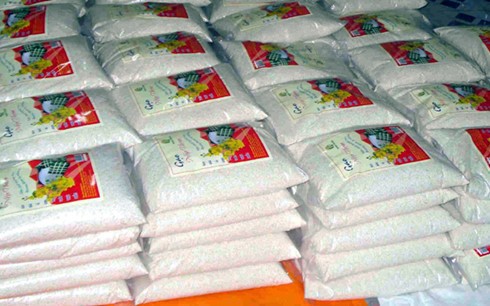(VOVworld) - Though Vietnam is the world’s third biggest rice exporter, the real value it gains remains modest. In order to penetrate major markets in the context of international economic integration, many domestic exporters are focusing on high-quality rice.
 |
| Exporting high-quality rice will not only bring higher profits but also promote the trademark Vietnamese rice. (Photo: KT) |
In recent years, exports of organic rice, a form of highly nutritious rice, has helped increase the output of Vietnam’s exports. This is significant for developing Vietnam’s rice trademark in the global market and changing old-fashioned rice cultivation practices.
Loc Troi food group is one of the leading enterprises to export high-quality rice to traditional markets such as Hong Kong, China, the US, Australia, the Netherlands and Chinese Taipei. Pham Thanh Tho, Deputy Director of Loc Troi, every year, the group sells 15,000 tons of rice in the domestic market while it exports high-quality rice to foreign markets, which earns a much higher revenue than the ordinary varieties. In order to produce high-quality rice, the group follows a closed value chain from the sourcing of seeds, to the growing, harvesting, processing and distribution of the final products.
Tho said that they “help farmers with farming tools and work with them in rice growing and harvesting and sales in line with the market price. We are targeting some major markets such as the US, Hong Kong, Singapore and European countries, which exempt taxes on rice products.”
According to agricultural experts, the demand for high-quality rice in the world’s markets is increasing but Vietnam’s supply of this kind of rice is still limited. Based on market demand, producing and exporting high-quality rice will not only bring higher profits but also promote the trademark Vietnamese rice. This requires a synchronous process from production to consumption and a change in export methods, and searching for minor markets but generating high value. Dr. Nguyen Do Anh Tuan, Director of the Institute of Policy and Strategy for Agriculture and Rural Development, said in the present context, building a trademark for Vietnamese rice is very significant. But this requires a long process and different factors from selecting seeds, irrigation systems and growing techniques.
According to Do Anh Tuan, “Vietnam’s agricultural sector wants to restructure the rice sector and aim for highly-demanding markets. Taking advantages of their rich natural resources and cheap workforce, our competitive rivalries such as Cambodia and Myanmar, are closely following us.”
Vietnam has mainly exported rice at a low price. But in the near future, this will not be a great advantage any more as Vietnam cannot compete with Thailand for great rice sourcing. Besides, with their geographical advantages, Indian and Pakistani rice also dominate the markets. Thus, it is essential for Vietnam to boost the production and quality of high-quality rice for export.
Le Van Banh of the Ministry of Agriculture and Rural Development said: “Vietnam has diversified rice varieties but the most important thing is to develop a trademark, produce greater quantities and use plant protection chemicals in allowed amounts. To do this, enterprises need to have a stable source of materials with clear origins. It should be sychronous in terms of rice varieties to assure success in the strategy of trademark building.”
The scheme to develop a Vietnamese rice trademark by 2020 with a vision toward 2030 shows fragrant rice and rice specialites will account for 30 percent of total Vietnamese rice exports by 2030. In order to expand high-quality exports to the US, Japan and Australia, enterprises and farmers need to further invest in rice seeds, quality, building a trademark and trade promotion.